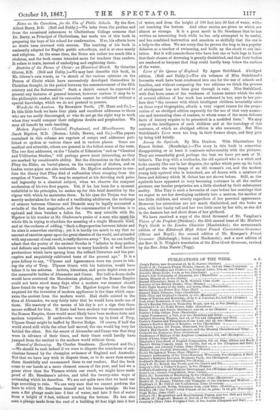Modern Inquiries : Classical, Professional, and Miscellaneous. By Jacob Bigelow,
M.D. (Boston : Little, Brown, and Co.)—The papers contained in this volume are reprints of essays and addresses pub- lished or spoken at various times and in various places. Some are medical and scientific, others are general in the fullest sense of the term. The two first addresses, on the "Limits of Education " and on "Classical and Utilitarian Studies," will perhaps prove most interesting, as they are marked by considerable ability. But the discussions on the death of Pliny the Elder, on burial-places, on the contagion of cholera, and on leaden water-pipes are also noticeable. Dr. Bigelow endeavours to con- fute the theory that Pliny died of suffocation when escaping from the -eruption of Vesuvius. We may be surprised at his devoting such pains and ingenuity to a classical subject, when we observe the rampant modernism of his two first papers. Yet, if he has been for a moment unfaithful to his principles, he makes up for this brief desertion by the vigour with which he maintains them. In his eyes the Trojan war was merely undertaken for the sake of a vacillating adulteress, the exchange of armour between Glaucus and Diomede may be legally accounted a swindle of the first magnitude, and the consummation of heroism is to mpbraid and then butcher a fallen foe. We may coincide with Dr. Bigelow in his wonder at Mr. Gladstone's praise of a man who spent his whole life in trying to elucidate the meaning of a single Homeric word, and at the coolness of adding, " Such a disproportion between labour and its aims is somewhat startling ; yet it is hardly too much to say that no amount of exertion spent upon the great classics of the world, and attended with anyamount of real result, is really thrown away." Yet, we can hardly admit that the poetry of the ancient Greeks is "inferior in deep pathos and delicate and unselfish tenderness to many hundreds of well known productions which have sprang from the refined literature and the per- ceptive and exquisitely cultivated taste of the present age." It is a pure fallacy to say, "Ulysses and Agamemnon were ten years in tak- ing the city of Troy. Ulysses Grant, with his batteries, would have taken it in ten minutes. Artists, historians, and poets depict even now 'the memorable battles of Alexander and Caesar. But half-a-dozen shells would have scattered the Macedonian phalanx, and the Roman Empire could not have stood many days after a modern war steamer should have found its way up the Tiber." Dr. Bigelow forgets that the time required for the invention of modern appliances is the time which sepa- rates the ancient from the modern world. Had shells existed in the time of Alexander, we may fairly infer that he would have made use of them. His mastery of the means of his day is not a sign that those means sufficed for him. If there had been modern war steamers under the Roman Empire, there would most likely have been modern forts and modern torpedoes. If earthworks were thrown up in front of Troy, Ulysses Grant might be baffled by Hector Dodge. Of course, if half the world stood still while the other half moved, the one would lag very far behind the other. But the secret of Alexander and Omar was that they were in advance of their times, and their times could hardly have jumped from the ancient to the modern world without them.






























 Previous page
Previous page